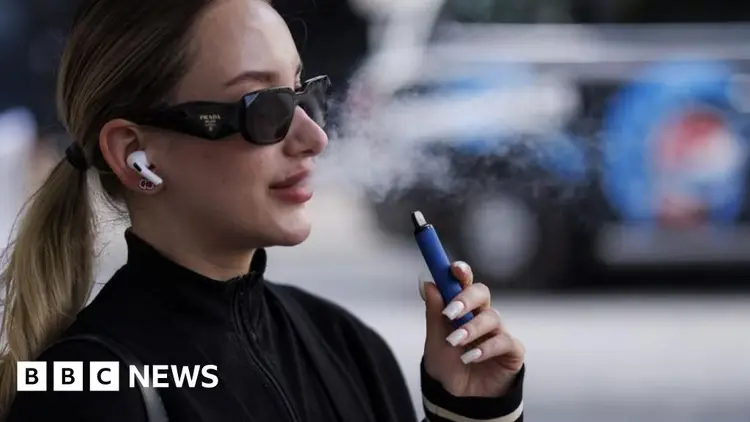Disposable vapes to be banned in England and Wales from June

The government intends to implement a law that will prohibit the sale of single-use vapes starting from June 1, 2025.
The government has announced that starting June of next year, the sale of single-use disposable vapes will be prohibited in England and Wales.
Officials in England stated that the decision, initially revealed in January by the previous administration but not implemented prior to the general election, aims to safeguard children's health and avoid harm to the environment.
The government announced that it has collaborated closely with the devolved nations and will coordinate the implementation dates for the bans. Wales has already indicated that it will implement similar measures.
Top figures in the vaping industry have cautioned that this action might lead to an increase in the illegal sale of these products.
The Scottish government announced that the ban on single-use vapes, originally set to start in April of next year, will be postponed until June 1. This decision aims to synchronize the regulations with those in England and Wales.
The Department for Environment, Food, and Rural Affairs (Defra) reported that the use of vapes in England has increased by over 400% from 2012 to 2023, with 9% of the UK population currently purchasing and using these devices.
In recent years, there has been a notable rise in the number of individuals who use vapes without any prior experience with smoking, largely influenced by young adults.
Selling vapes to anyone under the age of 18 is against the law. However, disposable vapes, which are usually marketed in smaller and more vibrant packaging compared to refillable options, are a major factor contributing to the concerning increase in vaping among young people, according to the previous government when they announced their strategy.
Public health minister Andrew Gwynne stated that prohibiting disposable vapes would make them less attractive to kids and help prevent access for at-risk young individuals.
The NHS states that while vaping poses significantly lower health risks compared to smoking, it hasn't been around long enough for experts to fully understand its long-term effects.
The former administration claimed that single-use vapes were a major factor contributing to the increase in vaping among young people.
The prohibition will not affect rechargeable or refillable devices.
According to the government, single-use vapes pose recycling challenges and usually end up in landfills. In these locations, the batteries can release toxic substances such as battery acid, lithium, and mercury into the surroundings.
Batteries discarded with regular trash lead to numerous fires in garbage trucks and recycling facilities each year.
According to Defra, nearly five million disposable vapes were either tossed aside as litter or thrown into regular trash each week last year. This figure represents a nearly four-fold rise compared to the previous year.
In 2022, over 40 tons of lithium were thrown away from vapes, which is enough to power 5,000 electric vehicles, according to the report.
Mary Creagh, a minister at Defra responsible for minimizing waste in the economy, stated that single-use vapes are "highly wasteful and are a nuisance in our towns and cities."
Pediatric respiratory specialist Dr. Claire Hogg spoke with BBC Radio 5 Live, explaining that single-use products have caused a widespread issue with nicotine dependency. She highlighted that a number of young people are experiencing sleep disturbances, difficulties with focus, and significant challenges related to addiction.
She mentioned that her son had used e-cigarettes in the past and considered the ban to be "fantastic news." She explained that he had become "hooked on nicotine due to misleading advertising" starting from the age of about 14.
Disposable vapes typically cost around £5, making them more affordable initially compared to many refillable vape kits, which usually range from £8 to £12. These disposable options can also be found at general retailers, not just specialized vape shops.
However, when considering costs over time, refillable kits are generally more economical than disposable ones.
Ireland and Belgium have recently announced their intentions to prohibit these products, joining other nations such as New Zealand, Australia, South Korea, India, and Brazil, which already have implemented restrictions.
John Dunne, the director general of the UK Vaping Industry Association, mentioned during an interview on BBC Radio 4's Today program that implementing a ban would only encourage illegal sales.
"We already have an underground market for vaping products that officials struggle to control, and now they’ll have to deal with this issue too," he stated.
Mr. Dunne mentioned that the association has urged the government to consider implementing a licensing system for retailers and distributors of these products. This system would include requirements such as mandatory age verification.
The government intends to bring in a law prohibiting the sale of single-use vapes starting on June 1, 2025. This measure will give shops an opportunity to sell off any remaining inventory. The ban will apply to all single-use vapes, no matter their country of origin.
The Department of Health and Social Care stated that when the ban is implemented, online stores and large retail platforms will need to utilize "online takedown procedures" to remove illegal sellers.
The regional governments have indicated plans to implement comparable bans, and the UK government mentioned that it is collaborating with them to synchronize the start dates for these bans.
Huw Irranca-Davies, the Deputy First Minister of Wales, stated that implementing the bans on the same day throughout the countries would ensure "strong compliance and a uniform method of enforcement across the UK."
This action is independent of the government's initiative to eliminate smoking by prohibiting the sale of cigarettes to individuals born after January 2009.
On Monday, Health Secretary Wes Streeting announced that a proposal to implement the ban would be brought before parliament before the end of the year.











































